
Anno 101 - 200

|
Popes on Parade Anno 101 - 200 |
POPshop |
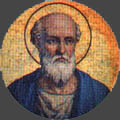 |
Saint EvaristusAnno Circa 99-107 |
A Greek, also known as Aristus. His name means "pleasing" or "acceptable". Nothing is known about him, and even the tradition of his martyrdom is a bit sketchy. |
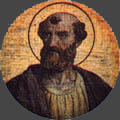 |
Saint Alexander IAnno Circa 107-116 |
An Italian, possibly Roman. His life is utterly obscure, though tradition records he died by decapitation on the Via Nomentana in Rome, becoming the first Pope to lose his head. He wasn't the last by a long shot. |
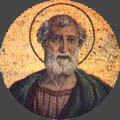 |
Saint Sixtus IXystus |
An Italian, possibly a Roman, who nevertheless continued the long trend of Greek names in the Papacy. The name Sixtus unsurprisingly means "sixth", and scholars thought this was in reference to his being Peter's sixth successor. Further research revealed that on the earliest documents his name was spelled Xystus, meaning "shaved". What had long been interpreted as a profound statement of his place in the grand scheme of salvation history turns out to have been just a fashion statement. Bearded or not, he died a martyr. |
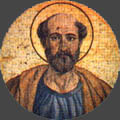 |
Saint TelesphorusAnno Circa 125-136 |
Possibly a Greek. Or not. His name means "bringing fruit to perfection" or "accomplishing one's purpose". St. Irenaeus, writing about forty years after the death of Telesphorus, says he suffered a "glorious martyrdom", and then completely neglects to mention how or where. |
 |
Saint HyginusAnno Circa 138-142 |
After an unaccounted gap of almost two years, the Greek philosopher Hyginus was elected Pope. Though his name means "wholesome, sound, healthy", it was during his pontificate that the Gnostic heretics Valentine and Cerdo took up residence in Rome. The cause of Hyginus' death is not recorded, but the proximity of heretics has been known to cause ulcers in bishops. |
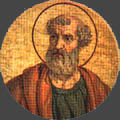 |
Saint Pius IAnno Circa 142-155 |
An Italian, possibly from Aquileia. His name (only the second Latin name adopted by a Pope) means "dutiful" and might be a reference, snide or otherwise, to the reigning Emperor Antoninus Pius. During his pontificate, a third Gnostic teacher, Marcion, moved into Rome. Perhaps to combat the rising tide of heresy, several orthodox apologists were invited to Rome, the most important of which was St. Justin, who was promptly martyred. |
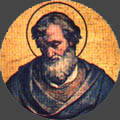 |
Saint AnicetusAnno Circa 154-165 |
A Syrian, possibly from Emesa. His name means "unconquered", perhaps a reference to his hope of stemming the heretical tide of Marcion, Marcellinus, Valentine, and Cordo. Anicetus and the elderly St. Polycarp had a famous (and heated) discussion about the correct date of Easter. Polycarp (and the church of Smyrna, which he represented) thought it ought to be on the 14th day of the month of Nissan, whereas the Romans had always celebrated it on the Sunday following this day. In the end, the Pope's decision was accepted, though it should be noted that Polycarp himself was still allowed to celebrate Easter any old time he wanted. |
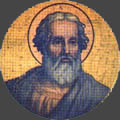 |
Saint SoterAnno Circa 166-174 |
An Italian, probably from Campania. His name means "deliverer" or "preserver" in Greek. Little is known of his life or pontificate, though a letter addressed to him from St. Dionysius of Corinth praises his pastoral care, particularly to the poor and unfortunate throughout the empire. He is the first Pope definitively known to not have died a martyr. |
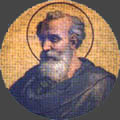 |
Saint EleutheriusAnno 174-189 |
A Greek from Epirus or Nicopolis. His name means "free-spirited". Eleutherius was a deacon under Anicetus and Soter. The Gnostic and Marcionite heretics continued to run around Rome, and these were soon joined by the charismatic Montanists. At first, Eleutherius preached tolerance of the Montanist tendencies for speaking in tongues and mass hysteria. When their prophet Montanus (who claimed to channel God) made the leap from charismatic to schismatic, the Pope put his foot down. Eleutherius excommunicated the Montanists, which by this time included many of the eastern churches. |
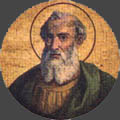 |
Saint Victor IAnno 189-198 |
An African; son of Felix. His name means, er, "victor". The "when exactly is Easter" controversy (see Pope Anicetus, above) was getting completely out of hand. In order to nail this down, Victor convened the first Roman Synod of bishops and asked the other chief Christian cities to do likewise. All of the western and many of the eastern bishops followed the Pope's lead (Sunday!), whereas the churches in Asia Minor, by and large, did not. So Victor excommunicated the lot of them. How seriously the Asian churches took this bit of news is unknown, but over the course of the next century they all adopted the Roman date. Victor also excommunicated one Theodotus the Tanner who set up a heretic commune in Rome. |
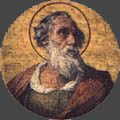 |
Saint ZephyrinusAnno 198-217 |
An Italian. Uneducated, with a weak mind and a weaker personality, Zephyrinus did nothing to stop the spread of heresy. His contemporaries were so disgusted with his lack of spine after the moxie of Victor that they took to calling him names. The only disagreement amongst the Church Fathers was what sort of horrible Zephyrinus was exactly; Hippolytus (the future antipope) called him "ignorant and greedy", whereas Callistus (the future Pope Calixtus I) preferred "unlearned and unskilled". So nice he could bring people together this way. And this guy is a saint why? |
Complete List of Popes
First Century |
Second Century |
Third Century |
Fourth Century |
Fifth Century
Sixth Century |
Seventh Century |
Eighth Century |
Ninth Century |
Tenth Century
Eleventh Century |
Twelfth Century |
Thirteenth Century |
Fourteenth Century |
Fifteenth Century
Sixteenth Century |
Seventeenth Century |
Eighteenth Century |
Ninteenth Century |
Twentieth Century
Twenty-First Century
Ecumenical Councils | Papal Box Scores